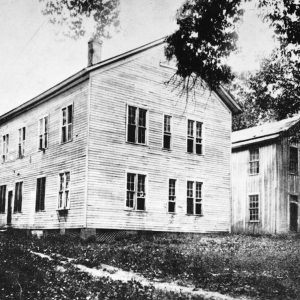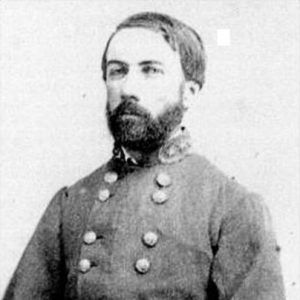calsfoundation@cals.org
Daniel Harvey Hill (1821–1889)
Daniel Harvey Hill was a Confederate general, professor, and president of what is now the University of Arkansas (UA) in Fayetteville (Washington County), then called Arkansas Industrial University.
Born on July 12, 1821 in York District, South Carolina, to Solomon Hill and Nancy Cabeen Hill, Daniel Harvey Hill was the youngest of eleven children. His father died four years later, and his mother raised the children with the help of her eldest son, William. The family owned a small plantation, and Hill grew up working the land.
Entering the U.S. Military Academy at West Point in 1838, Hill graduated four years later, ranking twenty-eighth in a class of fifty-six. Originally assigned to the Engineer Corps, Hill instead served in the artillery, as there were no open positions with the engineers. During the Mexican War, Hill received several brevet promotions and was twice cited for gallantry, finishing the war as a major. His home state presented him with a sword in recognition of his service.
Hill married Isabella Morrison in 1848. The next year, he resigned his commission and began teaching mathematics at Washington College in Virginia. In 1854, Hill began teaching at Davidson College in North Carolina, where his father-in-law had previously served as president. While at Davidson, Hill published a mathematics textbook to be used in southern schools, titled Elements of Algebra. Using examples that showed people from the South as honorable while citizens of the North were portrayed as greedy and rude, the textbook served more as a propaganda tool than an educational device.
In 1859, Hill became the superintendent of the North Carolina Military Institute in Charlotte. He served in this post until the outbreak of the Civil War in 1861, when he was named as colonel of the First North Carolina Infantry. Serving in the Eastern Theater and seeing action at Big Bethel, Hill received a promotion to brigadier general on July 10, 1861. By the next spring, Hill was serving as a major general and leading a division in the Peninsula Campaign and at Antietam. Although his actions were recognized on the field of battle, Hill clashed with Confederate commander Robert E. Lee. When the Army of Northern Virginia reorganized in the spring of 1863, Hill was left without a field command. He led the Department of North Carolina before returning to defend Richmond during the Gettysburg Campaign. On July 11, 1863, Hill received a promotion to lieutenant general.
Hill transferred to the Army of Tennessee in the summer of 1863, where he commanded a corps at the Battle of Chickamauga. Once more, personality conflicts interfered with Hill’s career, and when the army was reorganized, he was again left without a field command. Hill finally returned to field duty at the end of the war when he commanded a division in the Army of Tennessee and participated in its surrender in North Carolina.
At the conclusion of the war, Hill returned home to Charlotte and began publishing a magazine in 1866. Titled The Land We Love, the magazine focused on history, military science, and literary topics. In 1869, the magazine merged with the New Eclectic Magazine, and Hill founded a newspaper called The Southern Home. Hill was approached in 1877 to become the president of Arkansas Industrial University in Fayetteville.
The university suffered from a lack of state funding and leadership, with Hill becoming the third president in as many years. In June 1877, the entire faculty, including the president, lost their positions due to an insufficient appropriation from the state legislature; the board of trustees laid off all of the employees in an effort to save money. While several employees were hired back at reduced salaries, the institution would continue to struggle with finances during Hill’s early years as president.
College attendance fluctuated during Hill’s term, reaching a high of 150 in 1879 before decreasing to seventy-seven in 1882. Hill worked with the legislature to ensure that state support for the institution continued, increasing the annual appropriation throughout his tenure. Student life at the university became more rigid as the former general established a demerit system and expelled any student who became intoxicated while on campus. The academic focus of the university shifted from agricultural and mechanical subjects related to the Morrill Land Grant Act to a more classical educational system.
Hill’s vision for the university differed from that of many of the new, young faculty members on campus. While the president saw the institution as slightly more rigorous than a high school, many of the faculty sought to make the university into a true higher-education establishment. After several clashes with the faculty, Hill offered his resignation to the board of trustees in 1882. The board refused the resignation, and citizens across the state called on Hill to remain at the university. The situation did not improve, and, in February 1884, Hill again resigned. Convinced to remain until the end of the term in June, he departed Arkansas and moved to Georgia.
The next year, Hill became president of the Middle Georgia Military and Agricultural College in Milledgeville, where he served until resigning due to ill health in August 1889. He died on September 24, 1889, and is buried on the campus of Davidson College. His son, Joseph Morrison Hill, went on to become a justice of the Arkansas Supreme Court.
For additional information:
Bridges, Hal. Lee’s Maverick General: Daniel Harvey Hill. Lincoln: University of Nebraska Press, 1991.
Gilstrap, Marguerite. “Daniel Harvey Hill, Southern Propagandist.” Arkansas Historical Quarterly 2 (March 1943): 43–50.
Hale, Harrison. The University of Arkansas, 1871–1948. Fayetteville: University of Arkansas Alumni Association, 1948.
LeFlar, Robert. The First 100 Years: Centennial History of the University of Arkansas. Fayetteville: University of Arkansas Foundation, 1972.
Reynolds, John, and David Thomas. History of the University of Arkansas. Fayetteville: University of Arkansas, 1910.
Warner, Ezra. Generals in Gray: Lives of Confederate Commanders. Baton Rouge: Louisiana State University Press, 1987.
David Sesser
Henderson State University

 Arkansas Industrial University, 1871
Arkansas Industrial University, 1871  Daniel Harvey Hill
Daniel Harvey Hill 



Comments
No comments on this entry yet.